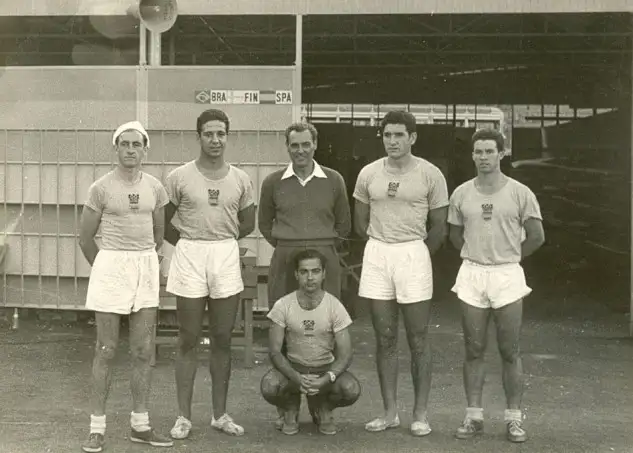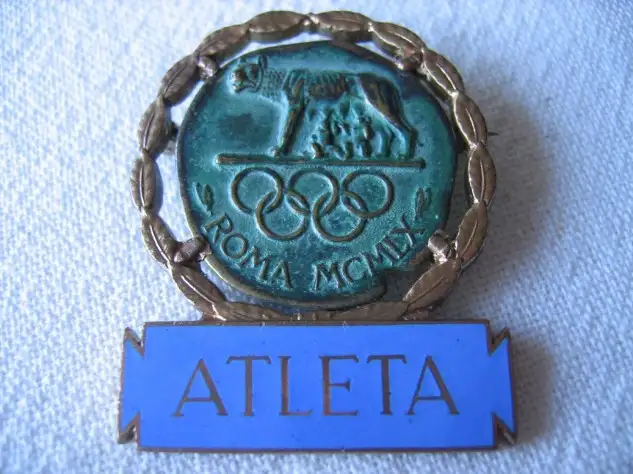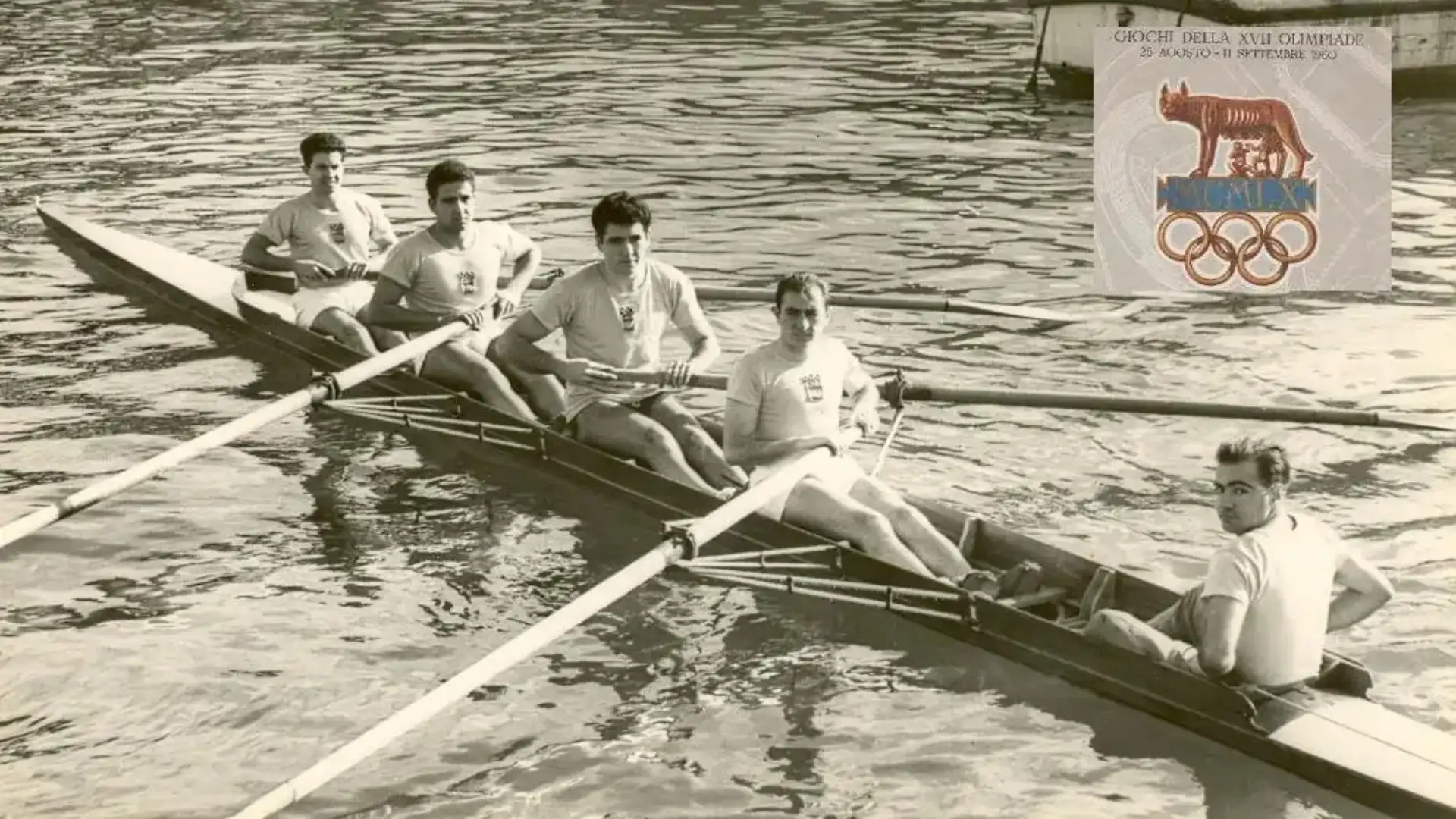
We have left José Luis Méndez one of the pillars of when the Nautico de Vigo was Spain
We have left José Luis Méndez one of the pillars of when the Nautico de Vigo was Spain
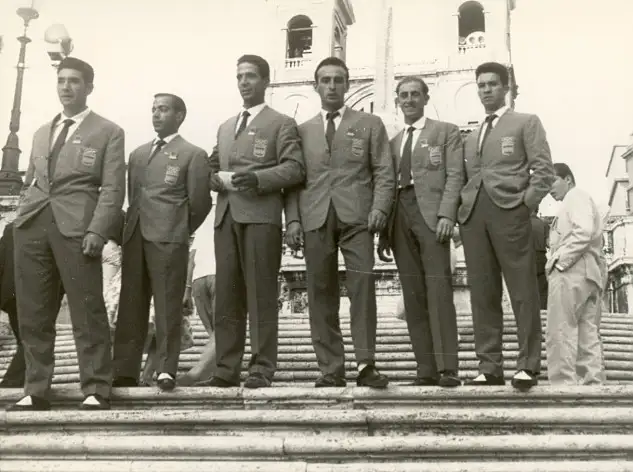
Alberto Valtierra Martínez, Emilio García Bengoechea, José Luis Méndez García, Franco Cobas González, remers headlines, along with Armando González González, timonel and Modesto Chillón García, reserve.
The great José Luis Méndez died... the world of the Vigo, Galician and Spanish rowing is in mourning. Mendez was one of the pillars of the Spanish Olympic rowing team in Rome 1960... when the outrigger of four with Spanish timonel... was composed in its entirety of remers of the Royal Nautical Club of Vigo. From Digital Nautics we want to join the tribute of his memory, with an article written by his friend and inseparable partner... Franco Cobas. Mendez, an exemplary sportsman, was one of the "culprits" that in that Olympic event in the Italian capital... the Royal Nautical Club of Vigo was Spain. Rest in peace.
Even today and with the perspective of time, I find it impossible for that feat to have come true. It was other times and it was not easy, to achieve an impossible goal like the Olympic Games. That "four with a timonel" rowing team that in 1958 worked to get to the Games, it did, but thanks to three years of energetic and magnificent work, and was able to move from nothing to Olympic glory. Six friends: remers, timonel and reserve, worked as Titans in the pursuit of a dream. They were enlightened that after infinite efforts, courage, illusion and confidence in winning utopia, they achieved their goal. It was nothing simple to do. Time by hour, day by day, month by month, they were taking steps towards an impossible goal. They dreamed and were faithful to the saying "wanting is power" and with infinite faith in their work and efforts, and after three long and difficult years, they succeeded.
In August 1960 in Rome, they culminated in a milestone and an impossible feat for which they had worked and fought so much: to compete in the Olympic Games. They went from nowhere, to touch the sky, to win the glory, to reach the infinite but limited universe, of the gods sons of Zeus. It all started in October 1958 when they launched their unrenounced ambition. In the Royal Nautical Club of Vigo, to which they belonged, there was only a boat, a "outrigger of four with timonel"of Spanish manufacture, by the firm Saetia, and had arrived granted by the Spanish Federation a year earlier. It was a modality that in Vigo and Galicia was neither known nor practiced. But given the great activity of rowing in iolas that existed in the Nautico de Vigo, the Spanish wanted Galicia and in particular the Nautico to be incorporated into the practice of this difficult Olympic discipline. And it was right, because some Viguese remers soon accepted the challenge.
The seed germinated and in three years it grew, overflowed and blossomed. Starting from scratch, those neural of the Olympic oar, they began to train and perform training programs, which they did not know, nor knew even if they were positive or negative. It didn't matter. The case was to make miles and hours on the boat. That was clear. It was an absolutely empirical preparation. They were saying, today we do a training and if it doesn't go well, tomorrow we fix it. It was working on the experience itself. No help, no coach, of course no financial proposal. Even the old, shaved slippers, their fingers were up the tip. With nothing but their ambition, they fought against the adversities and gradually grew in technical quality and supreme dream, and when they had the first chance, they took advantage of it.
In April 1959 they were given the opportunity to check and calibrate their work for the first time. A race in Tui in which they faced two high-level Portuguese teams who gave them the big back. One was the Nautical Club of Viana do Castelo, but as an outstanding rival was the S.C.Caminhense, an international team from Portugal, globalist, pre-Olympic and with all technical and sports blessings. The Caminhense was the great "coconut" of the Iberian rowing and they were going to face them. With great surprise they won that race. They defeated the Caminhense and their victory was a crucial and definitive aldabonazo in their high aptitude. That triumph showed them that they were on the right path that they had proposed.
If they had lost that race, their hopes and ambitions would probably have faded, their wings would be broken and their project in water of drafts. But that victory fed them new illusions, new goals and wonderful sensations. In 1959, in the Spanish Championship at the Grundense Lake of Bañolas, they were second, but the team was already working and its defeat was more than anything else due to its lack of experience in competitions. Proof of of this is that in the media environment of the Spanish rowing we began to speak very seriously and with admiration of that Vigo team that was surprising, and very pleasantly, in the Spanish Championship. A subchampionship that surprised everyone but them, who knew they could more Where'd those guys come from that were allowed to get so high? It was the question in the environment and in the specialized press.
The following year 1960, the Olympic year, and in the same lake of Bañolas, the eclipsion was beautiful and strong. They won the Spanish Championship, on their own, taking 23 seconds in the second and bouncing the record of Bañolas Lake. His demolating performance showed, in length, his category and high level. His essences were confirmed as a great technical and physical team. They set the best of all Spanish teams according to the Italian table, and their Olympic selection left no doubt. After a month of concentration and training in Bañolas in the days of July and August prior to the Games with the Spanish Selection of Remo, along with the Skiff of the Club Ruber of Barcelona; the two with timonel of the Nautico Club of Seville and the eight with timonel of Ur-Kirolak of San Sebastián, they traveled to Rome by road from Bañolas, with the ships on the bus. They enjoyed a lucky trip. For three days they met the French Blue Coast, Cannes, Nice, Monaco and then the Italian Riviera, Ventimiglia, Bordighera, San Remo, Imperiaa, Alassio.
In Rome, the experience was incredible and they kept admiring with the eyes of a young child, new impressions and experiences every day. Audience in the Vatican Square of Pope John XXIII; the emotions of living with athletes from all over the world in the Olympic Villa; meeting illustrious characters from the social, sports, cultural and political life of the world, who went to Rome as tourists, Grace Kelly, Princess of Monaco who was with us on Lake Albano where the rowing tests were held, Bing Crosby, Elisabeth Taylor, the Shah of Persia, still Prince Juan Carlos and his father D. Juan de Borbón, Princess Sofia of Greece who was part of the Greek team and participated in the sailing tests, where his brother was the Olympic champion. Or meet great world sports gods like Abebe Bikila, Wilma Rudolph, Armin Hary, Cassius Clay, before being Muhamad Ali, Rafer Johnson, Viatcheslav Ivanov, Herb Elliot, Ingrid Kramer, Dawn Fraser, the Konrad brothers and so many others. There, in the Olympic Villa, we were all and it was normal to cross each day with a few of these admired athletes. We were hard to believe, but there we were all living together as friends.
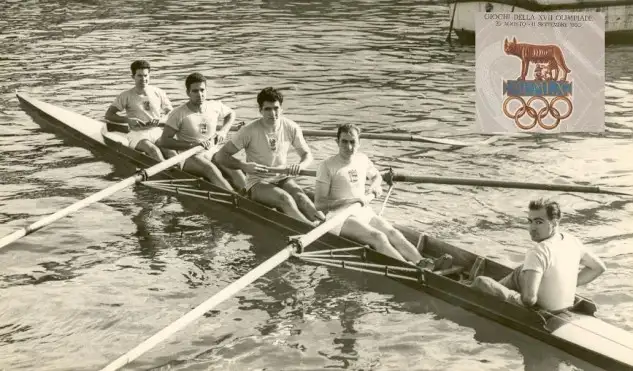
A whole club has rarely represented a whole country. The Royal Nautical Club of Vigo achieved this when very few reached Olympic glory.
Being and competing in an Olympic Games was a unique experience and left a deep mark on our memories and hearts. Alberto Valtierra Martínez, Emilio García Bengoechea, José Luis Méndez García, Franco Cobas González, holders, together with Armando González González, timonel and Modesto Chillón García, reserve, we were happy and happy friends to have ridden in a magical Olympic breeze on Lake Albano, 25 kmtrs. to the south of Rome, facing all the countries of the world, representing Spain and with the shield of the Spanish Olympic Committee on the chest. We didn't win medals, but we couldn't aspire to them either. We were ten-fifths out of 31 countries and getting more than that would have been a miracle. But for us, being there and competing in the Olympic palestra, it was an immense reward to our three-year work in hard struggle with our effort, work, conviction, illusion, ambition and confidence in making utopia a reality, as it was. This feat left a mark on us and means a glorious milestone in our lives.
In three years we have been able to move "from nothing to Olympic glory."
Franco Cobas González (Olympic in Rome 1960)
© 2024 Nautica Digital Europe - www.nauticadigital.eu


